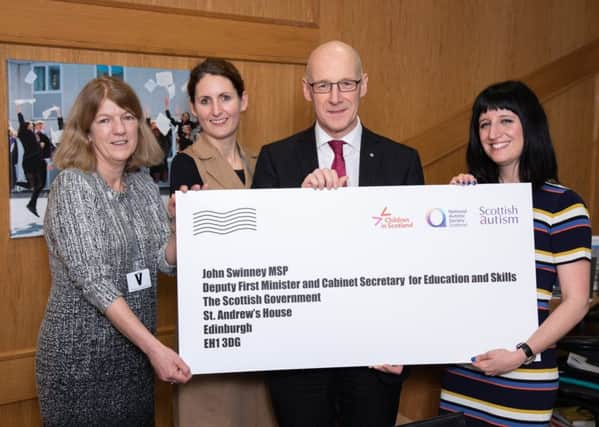More must be done to guarantee a proper education for autistic youngsters – Nick Ward


These children are being sent home and the formal exclusion process, which ensures that pupils receive support, an education and a smooth return to the classroom, is being ignored. Scottish Government guidance is clear that this shouldn’t happen. But it is happening, in every local authority area in Scotland. And the Scottish Government isn’t taking action to stop it.
This scandal was exposed in “Not Included, Not Engaged, Not Involved”, the report the National Autistic Society Scotland launched in September in partnership with Children in Scotland and Scottish Autism. We surveyed over 1,400 parents whose autistic children had missed school in the last two years, and found that more than a third had been unlawfully excluded – with almost a quarter saying this happened multiple times a week.
Advertisement
Hide AdAdvertisement
Hide AdOur report included nine recommendations that, if implemented, will protect autistic children from unlawful exclusions and ensure they are able to access and flourish in education. Since its publication we have been working flat out to turn those recommendations into a reality.
In October the Cross Party Group on Autism had a special meeting on Not Engaged. This was convened by Annie Wells, MSP, and attended by Alexander Burnett, MSP, Daniel Johnson, MSP, Johann Lamont MSP, and Mark McDonald, MSP. The Deputy First Minister and Cabinet Secretary for Education and Skills, John Swinney, was there to answer questions and hear from autistic people and their families. Some of the experiences shared were traumatic, underlining the impact that having a child out of school has on the whole family and that reform is desperately needed.
In November, our three charities met with Mr Swinney to present the findings of the report and, importantly, discuss our recommendations. And not long after hearing from us, he also heard from around 3,000 supporters when we presented him with a letter demanding action on those recommendations. We were ultimately disappointed in the response to the letter – visit www.notengaged.com and click on the recent updates tab to read our thoughts on what Mr Swinney had to say. Despite that disappointment, I am really grateful to everyone who took the time to sign that letter and show the breadth of support for our campaign.
I am also very grateful to Suzanne, the mum who met with Mr Swinney earlier this month. She really brought the statistics in Not Engaged to life by telling him about her fight against her son’s unlawful exclusion, and I am pleased that he agreed her family should never have been put in that position.
In my opinion, the most important recommendation made in our report is for high-quality training in autism to be mandatory for all teachers. This isn’t a criticism. As a former teacher, I know first-hand how tough it can be. However a massive 72 per cent of respondents to our Not Engaged survey felt that school staff having a better understanding of how their child’s autism affects them could have helped.
Today the National Autistic Society Scotland, Children in Scotland and Scottish Autism are attending a round table session to discuss that recommendation. This is being hosted by Mr Swinney and attended by representatives of the General Teaching Council, Education Scotland, COSLA and the Educational Institute of Scotland, amongst others. All the key people will be round that table and I hope we can agree that autism training should be a requirement for all teachers. We know that all teachers will have autistic pupils in their classrooms throughout their careers and, to be blunt, I simply don’t understand how they can be expected to do their job without the right tools and training. It isn’t fair on teachers or pupils.
In the space of just five months, The National Autistic Society Scotland, Children in Scotland and Scottish Autism have met with Mr Swinney four times. That’s a real achievement and it shows that he’s listening to what we have to say.
But what we really need is for him to take action. He must show leadership to ensure that autistic children and young people feel included, engaged and involved in their education.
Advertisement
Hide AdAdvertisement
Hide AdThe National Autistic Society Scotland’s Education Rights service provides impartial and confidential information and support to families. To find out more, pleas-e visit www.autism.org.uk/education-rights
Nick Ward, director of the National Autistic Society Scotland